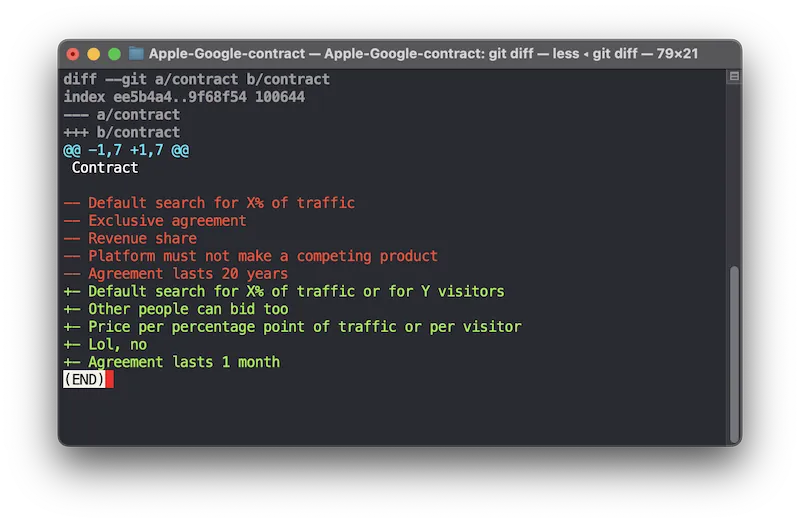United States v. Google, No. 20-cv-3010 (APM) (D.D.C. Aug. 5, 2024).
In August 2024, the ruling came in the case of United States v. Google regarding the default search agreement between Google and Apple.
Let’s take a quick look at how Google was found liable and the actual agreement. Then let’s see the new agreement they will switch to and what it means for you, someone that uses an iPhone.
The opinion of the court
Google was found liable in the court opinion. And although the ruling is 286 pages long, the conclusions of law, just the headings in the opinion, are very clear and tell a story you are probably already familiar with:
- Google has monopoly power in the general search services market.
- The [Apple] agreements are exclusive.
- The exclusive agreements cause anticompetitive effects in the general search services market.
- The exclusive agreements foreclose a substantial share of the market.
- The exclusive agreements allow Google to profitably charge supracompetitive prices for text advertisements.
- The exclusive agreements have allowed Google to degrade the quality of its text advertisements.
- The exclusive agreements have capped rivals’ advertising revenue
So basically the court just learned what human beings on Earth already knew for 10+ years. 😆
And the legal conclusion:
Google has violated Section 2 of the Sherman Act by maintaining its monopoly in two product markets in the United States—general search services and general text advertising—through its exclusive distribution agreements.
So let’s look at this agreement.
The agreement
Looking just at the agreement with Apple, Google is the default search engine for Safari on iOS. And additionally, Apple agrees not to make a competing product on its own. Google pays Apple on the basis of a revenue share agreement. In 2021 this was over $26 billion.
Google has replicated this agreement with other partners. And the conclusion is that “most devices in the United States come preloaded exclusively with Google”.
So basically it’s a joint venture that Apple wittingly joined. There are probably many causes of action to bring liability to Apple too.
So Apple, as well as Google, should be motivated to find a new agreement. Obviously just ending the agreement is not preferred. $26 billion gravy trains are hard to derail.
The new agreement
The new agreement is so simple, you’ll be surprised Apple didn’t launch with this first. Let’s compare.
It is an agreement between the search engine and the platform (e.g. Apple).
| Old agreement | New agreement |
|---|---|
| Default search for X% of traffic | Default search for X% of traffic or for Y visitors |
| Exclusive agreement | Other people can bid too |
| Revenue share | Price per percentage point of traffic or per visitor |
| Platform must not make a competing product | Lol, no |
| Agreement lasts 20 years | Agreement lasts 1 month |
In other words, the new agreement is a discriminatory auction or a Dutch auction.
So if Google bids 3¢ per query and wants to buy all of them, but DuckDuckGo bids 4¢ per query for up to 10% of the queries, then DuckDuckGo will get 10% of the queries and Google will get the rest. And the deal resets every month.
This allows Apple to maximize revenue. It allows DuckDuckGo to purchase some traffic. And it allows Apple to build a search engine if they want to.

How it effects you
As somebody who uses an iPhone and who never changes their default search engine, you will see once in a while see a duck at the top of your page instead of a G.
The remedies court case hasn’t even started yet, and Apple hasn’t read this proposal yet. So you can expect this in the year 2035 or later.
▧
Comments
There are no comments yet.
Please discuss this topic anywhere and let me know any great comments or media coverage I should link here.